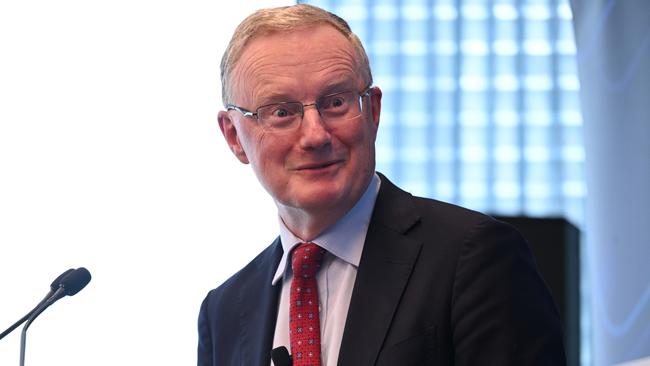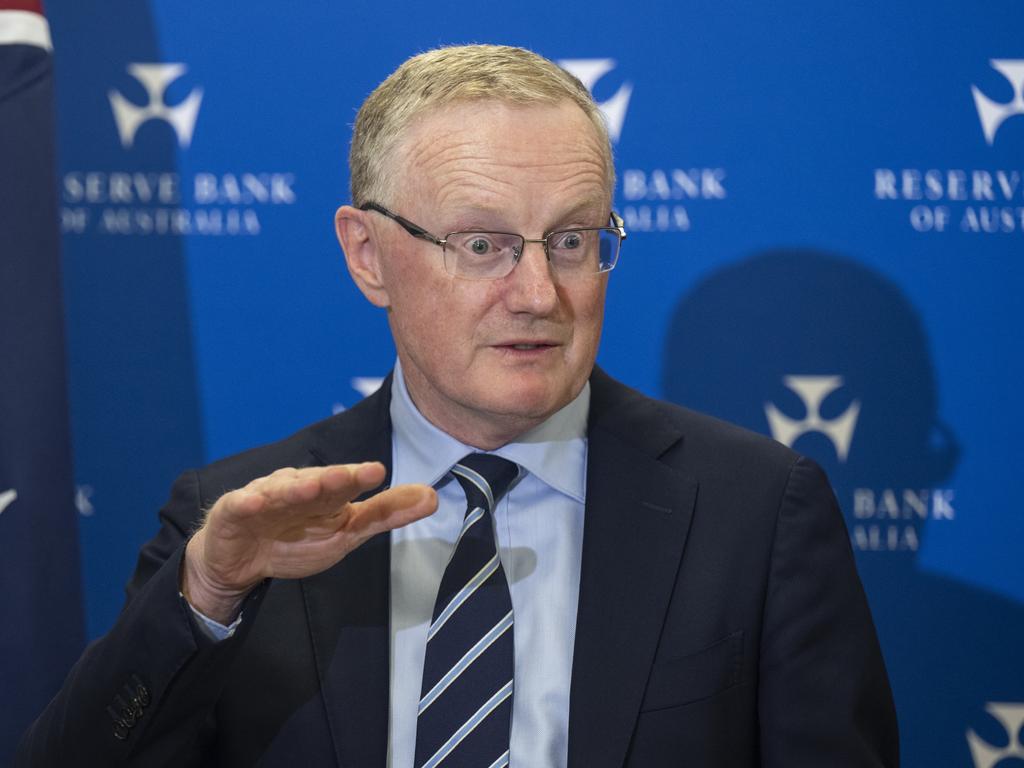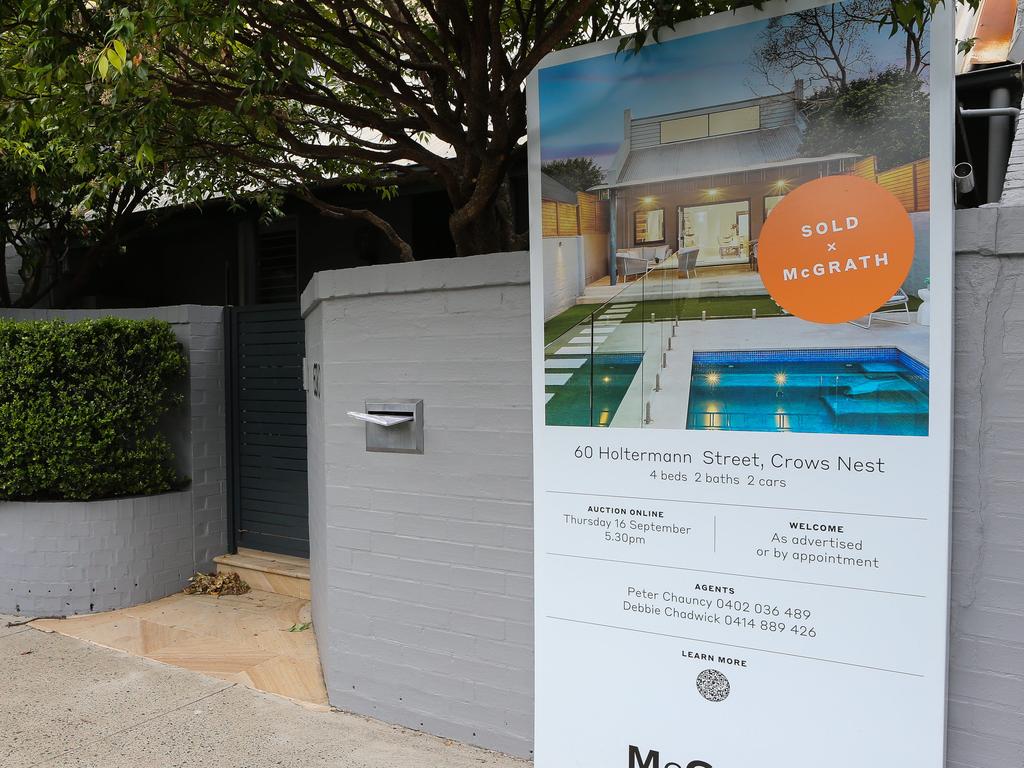Across-the-board wage hikes a ‘risk to economy’: Philip Lowe
Across-the-board wage rises of 5 per cent would make it harder to tame inflation, but rapid interest rate rises will not trigger a recession, Philip Lowe says.

Reserve Bank governor Philip Lowe is warning that across-the-board wage rises of 5 per cent or more would make it harder to tame inflation without sinking the economy, but he says rapid interest rate rises will not tip the nation into recession.
In a speech in Sydney on Tuesday, Dr Lowe said Australians should be prepared for more interest rate increases, after back-to-back hikes in May and June lifted the cash rate target from 0.1 per cent to 0.85 per cent.
As unions push for more wage rises after the Fair Work Commission’s minimum wage hike this month, Dr Lowe warned of the potential for a wage-price spiral taking hold, which would necessitate a slower economy and rising unemployment to bring it back under control.
“In the 1970s wages growth responded mechanically to the higher inflation rate,” Dr Lowe told the American Chamber of Commerce.
“I’m hopeful we can avoid that, but it’s an important issue. (So) 3.5 per cent (wage growth) is better than 2, and it’s better than 5.”
Employers are pushing back against increasingly strident union demands for bigger worker pay increases to maintain living standards as the prices of fuel, food and electricity soar.
The Australian revealed last week that the Finance Sector Union had called for 6 per cent pay rises for workers at Westpac while the National Australia Bank, and the Electrical Trades Union will push for a similar annual increase for workers in the power and commercial construction sectors.
The RBA governor would not be drawn on Tuesday whether the Fair Work Commission’s recent decision to deliver a 5.2 per cent minimum wage increase risked pushing inflation higher.
But he said he wanted Australians to “keep in mind” that a sustainable level of wages growth was in the order of 3.5 per cent.
Dr Lowe said there was no “preset path” for rates and the RBA board would be “watching household spending carefully”.
Dr Lowe pledged not to repeat the costly mistakes of the 1970s stagflationary period, saying he was “committed to do what is necessary” to squash inflation before it became entrenched in the national psyche.
“A lesson from the 1970s is that if an inflation shock shifts people’s expectations about the ongoing rate of inflation, it becomes harder to reverse,” he said.
“Applying this lesson to today, it is important that the higher rate of inflation this year does not feed through into ongoing inflation expectations.
“If it did, the period of higher inflation would persist and it would be more costly to reverse.”
Dr Lowe repeated that he now expected inflation would peak at 7 per cent around the end of this year, but added: “I hope people understand this is a spike in inflation largely due to Covid and the terrible events in Ukraine.”
Australians “should have confidence” that inflation would fall from early next year.
“It is important that we chart our way back to an inflation rate in the 2 to 3 per cent target range,” Dr Lowe said.
“We do not need to, nor can we, get there immediately.”
He added that consumer price growth might not drop to below 3 per cent for a number of years.
The RBA board is expected to lift rates by a further half a percentage point to 1.35 per cent when the board next meets on July 5.
Financial markets around the world have plunged over recent weeks as investors become increasingly convinced that the US Federal Reserve will not manage to get soaring inflation under control without triggering a recession.
On Tuesday, Dr Lowe said: “The higher interest rates globally will help to create a more sustainable balance between the demand for goods and services and the ability of our economies to meet that demand”.
But achieving that balance was not straightforward and there were risks involved.
Dr Lowe was optimistic that the RBA could raise rates in a way that reduced inflationary pressures without sending unemployment higher, although it was “a fairly narrow path we are on”.
“I don’t see a recession on the horizon here,” Dr Lowe said.
“At the moment the unemployment rate is the lowest in 50 years. There are more working Australians who have jobs than ever before.
“Households have strong balance sheets. Our terms of trade are at the highest ever, which is really boosting our national income.
“But if the last two years have taught us anything, it’s that you can’t rule anything out.
“Our fundamentals are strong and firms are trying to hire people at record rates. It doesn’t feel like a precursor to a recession.”
Jim Chalmers said inflation “would get worse before it gets better”, and cost pressures were already “making life very difficult” for households and businesses.
“And as interest rates rise further, as flagged by the Reserve Bank governor, it will obviously make it harder for Australians to service their mortgages as well, so this is really difficult,” the Treasurer said.
“We have reason to be cautiously optimistic about the future of our economy but first we need to navigate these difficulties which are right ahead of us.”
Dr Lowe said the central bank would be very carefully tracking the impact of higher borrowing costs on household spending.
At the next meeting in July the board would once again consider whether to raise rates by a quarter of a percentage point, or by a half.
He played down financial market bets that the cash rate would climb to 4 per cent by the end of this year, saying such an outcome was not “particularly likely” nor “reasonable”.
“To get to 4 per cent we would need to raise rates by 50 basis points at the remaining six meetings, and have a 75 basis point increase in there as well,” he said.
“I’ll leave it to others whether that’s reasonable.”
Dr Lowe went on to note that such an outcome ”would be the sharpest and quickest monetary policy tightening ever experienced in the inflation targeting regime”.
“I don’t think it’s particularly likely, but the market has been a better judge than we have over the past few years so you have to pay attention,” he said.
Dr Lowe’s speech comes at a time of growing discontent about the RBA’s extraordinary monetary policy interventions during the pandemic, and the only belated removal of those measures and ultra-easing settings.
With Dr Chalmers set to oversee an externally led review this year into the central bank’s governance and practices, a Reserve Bank internal review of its Covid-era commitment to keep rates pinned at virtually zero all the way out to three years had “caused some reputational damage to the bank”.







To join the conversation, please log in. Don't have an account? Register
Join the conversation, you are commenting as Logout